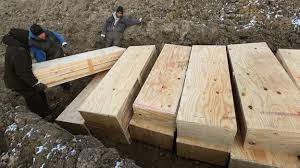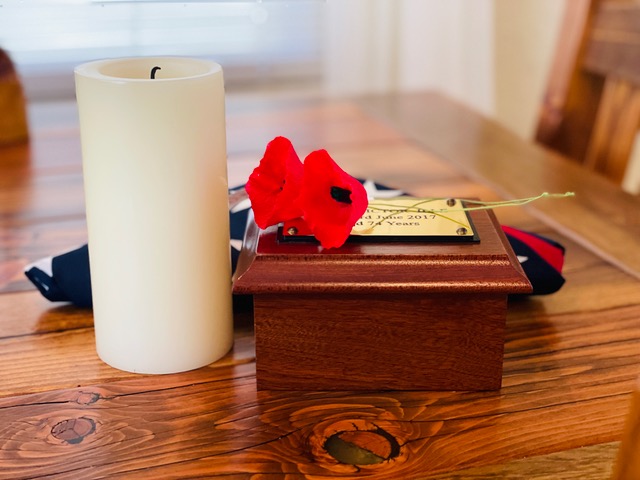The reality for many families in the United States today is that a funeral can mean a financial crisis. With 76% of Americans living paycheck to paycheck, 25% living below the poverty line, and 35% in debt recovery, these really are hard times for many average hard-working Americans! The story is a familiar one: working two jobs, juggling mortgage, utility, and car payments, seeking out deals wherever money can be saved, and hoping that nothing comes along unexpectedly to disrupt this fine balance!
In this guide, we have outlined what help is available, who qualifies for financial assistance, how to find out about indigent burial, how whole-body donation can be an option, how you may be able to claim for a COVID death and other fund-raising options.
Visit How Much Does Cremation Cost in 2024? for a breakdown of direct cremation costs.
 Who is responsible for paying the funeral bill?
Who is responsible for paying the funeral bill?
If the deceased died without a funeral plan, money in his/her estate, or a life insurance policy, then the immediate next of kin (and generally the person making the funeral arrangements) becomes responsible for paying the funeral home bill. In many cases, several family members may agree to share the costs.
If the funeral home has collected the deceased and arranged a funeral planning conference with the family, a ‘funeral contract’ will be drafted that outlines the costs. Once signed, this is a legally binding contract for services, and if you fail to honor this contract and pay for services as agreed, the funeral home can take you to court.
What responsibility does the state have to help families with funeral costs?
The state is responsible for conducting the dispositions of those individuals who die within the state’s care. Primarily, this means those who have been residents in state-owned institutions, such as those individuals who have been incarcerated in prisons, sectioned into mental institutions, in care in residential nursing homes, homeless individuals, and sometimes those who are a victim of a crime.
These are referred to as “indigents”. The state is only responsible for performing the most basic disposition services. Traditionally, this was a basic burial in a ‘pauper’ section of a local municipal cemetery. What could also be referred to as a “pauper burial.”
Today, more Counties are opting to use direct cremation as a cheaper and simpler alternative to burial. A direct cremation can be performed in most states (at a cost to the county) for around $300 – $500.
Unfortunately, more counties are finding their own budgets stretched as more families struggle financially. Where a county may have to deal with 10 – 20 cases a year, numbers in 2018 began to inflate significantly.
Several local news outlets have reported indigent cases rising by as much as 50%, as this recent story from Salt Lake County in Utah exposes.
 What is an indigent burial?
What is an indigent burial?
Where a state has an ‘indigent burial assistance’ program, there may be some ascribed funding to support those on welfare with a basic disposition.
The level of support varies tremendously by state and county, and many areas have been axed as municipal budgets have been tightened. 25% of Americans may be below the poverty line, but in most cases, only 50% of those under the poverty line are considered indigent.1
What financial help is there for low-income families with the cost of a funeral?
The Federal Poverty Level (FPL) assesses how an individual/family may qualify for many low-income assistance programs, and the same applies to fund funeral costs. Many families often misinterpret the phrase ‘indigent death,’ believing it to mean an entitlement for a low-income stipend and assuming that the city will automatically take over the costs.
If you are a low-income family or individual and wish to find out if any financial support is available to assist with funeral costs, you should consult your local county Human Services Department to ascertain what (if any) assistance there may be.
Check out these state funeral planning guides for state-relevant information (if available).

You must be prepared that you WILL have to conform to rigid assessments for qualification, and if the state provides funding, they will only offer basic services over which you will have very little control!
The state is likely to offer a direct cremation or a basic funeral. Remember that you can now arrange a simple, basic, dignified cremation for between $500 and $995 in many areas.
This enables you to remain in control of the disposition process and provides the opportunity to conduct a family-led funeral by having the deceased immediately cremated and then conducting your own memorial or ash scattering services.
The DFS Memorials network of low-cost cremation providers can help you find your nearest and most affordable cremation provider.
If the deceased qualifies, you may also be able to claim the $255 lump-sum death benefit payment that Social Security pays out. (The funeral director will assist you with submitting this claim) Another possibility that has more recently become available as an alternative for those families who cannot afford a funeral is a whole body donation.
This is where is the deceased’s body is donated to an institution for research, and the institution or body donation organization covers the costs of cremation. In some areas, funeral homes are affiliated with body donation organizations and can directly offer this to families. Some funeral homes refuse to because it is not part of the level of funeral ‘service’ they wish to offer. You can, however, deal directly with a body donation organization to donate.
You can read more about ‘Body Donation’ on US Funerals Online.
 How does a family claim financial assistance from the county for a funeral?
How does a family claim financial assistance from the county for a funeral?
Budgets are generally managed at a county or city level, and the Human Services (or sometimes Social Services) department handles these budgets and claims for assistance. The application process can be onerous and stringent, and any assets, life insurance, and savings will be considered. In some areas, a county judge has the ultimate authority to decide whether to accept or decline applications for a burial assistance program.
If funding is awarded for a low-income case, this will usually seal the cost that can be spent on a funeral. For example, in Massachusetts, a program offers burial support of costs up to $1,100 for a funeral that cannot exceed a total cost of $1,500, and in New York, a low-income family (if qualifying) can claim up to $900 towards the cost of a funeral, but it must not exceed a total cost of $1,700.
If you want to find out if funding is available in your county, check with your Human Services or Social Services department.
What if I don’t qualify for financial support and I still cannot afford a funeral?

Your best option is to arrange the least expensive disposition available to you. This is a direct cremation. You can generally arrange this for between $500 and $1,000 in most metro areas and for under $1,500 in most other areas. This can still be a simple and yet dignified send-off. Once the direct cremation is conducted and you have the cremation ashes back, you can arrange a family gathering and a private memorial ceremony. Contact your nearest DFS Memorials provider to find a low-cost cremation.
Fund-raising to meet funeral expenses
More families are forced down this route today. If you opt for a simple, basic cremation, this can be achieved for between $500 – $1000, and this is a more realistic amount to raise with some fund-raising activity. Be it car washes, BBQs, yard sales, or a community event – this can prove a means to help meet the full cost of a cremation.
‘No Cost’ cremation
If you absolutely have no funds to cover funeral expenses and cannot raise funds to pay for a basic cremation or burial, then you may wish to consider a whole-body donation. This is not always the easy solution, as not every donation is accepted. However, it may be a solution if you cannot afford a funeral and you are willing to consider an anatomical donation. You can donate via a local medical school or national donation company. Many funeral homes now even liaise on your behalf.
FEMA Funeral Assistance Program
From April 2021, a new fund was made available via FEMA to help families who incurred funeral expenses as a result of losing a loved one to COVID. Up to $9,000 can be claimed for funeral costs for deaths after January 2020. Read our Guide to FEMA Funeral Assistance for full details on how to claim,
There are some other options you can consider to help you raise funds for a funeral. Reading ‘What are your options on how to pay for a funeral or cremation?’ and ‘Crowdfunding a Funeral’ may give you some further ideas.
Sources:



